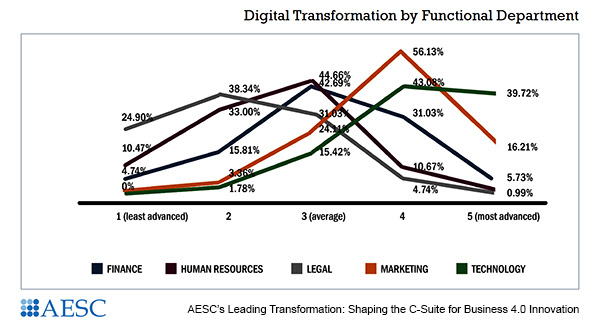 Marketing and technology departments lead the pack when it comes to digital transformation, while legal and HR bring up the rear.
Marketing and technology departments lead the pack when it comes to digital transformation, while legal and HR bring up the rear.
According to a study from the Association of Executive Search and Leadership Consultants, digital transformation within companies is a victim of siloing from department to department—and human resources and legal departments were ranked the least advanced in that digital transformation.
The study, “Leading Transformation: Shaping the C-Suite for Business 4.0 Innovation,” says that survey respondents—all executive search and leadership consultants who advise organizations of all sizes and across industries—put marketing and technology departments at the other end of the spectrum. And in what might be the most disturbing factor, the study reports that there was no significant variation in rankings by geographic region, with HR and legal both finishing at the bottom in all major locales.
Related: To better compete for talent, HR needs to adapt
According to the survey, there are five major obstacles that keep organizations from achieving enterprise-wide digital transformation:
- Legacy approaches
- Lack of talent
- Lack of investment
- Resistance to change
- Lack of clear definition
Having personnel not up to the challenge of implementing such a transformation—or who don't understand or support it—can hold back the entire organization, as can failing to put enough funds behind the effort or failing to see how the change can help the business.
According to the report, Industry 4.0 technologies are advancing at a rapid pace, and business owners who fail to understand how to best leverage emerging technologies for competitive industry advantage or to provide the leadership required to foster cultures of innovation will be left behind.
As a result, they need to find people to champion the transformation in all departments to be able to attract the kind of personnel they need to keep their businesses moving into the future. The report points out that legacy approaches and environments are actually already causing problems with recruiting. It quotes a consultant saying, “The next generation of executive talent, they don't want to work in the office environments of yesterday, they want to work in a WeWork office.”
The consultant adds, “They can interact with other companies and other cultures—exchange culture between companies. They can listen to how other brands approach challenges, it's much more informal. It's become difficult to recruit talent to implement digital transformation strategies for very traditional companies because they don't attract, they are not sexy. It's a culture issue.”
And if the problem is in HR, it could be a bigger problem than the organization realizes, since that's how innovative and creative people get their feet in the door.
Read more:
© 2025 ALM Global, LLC, All Rights Reserved. Request academic re-use from www.copyright.com. All other uses, submit a request to [email protected]. For more information visit Asset & Logo Licensing.







